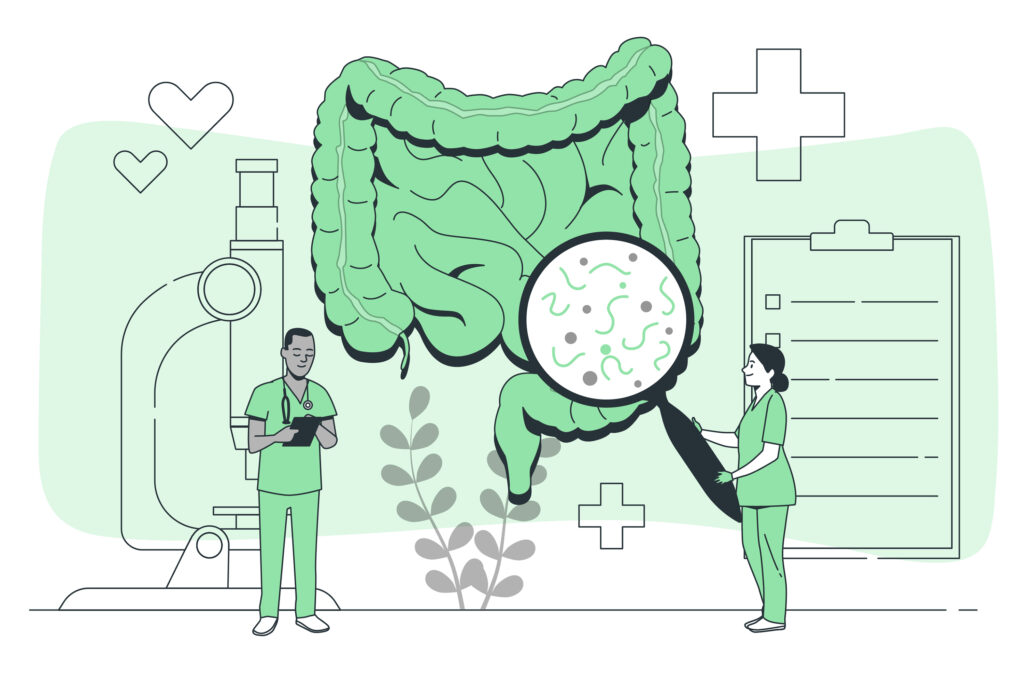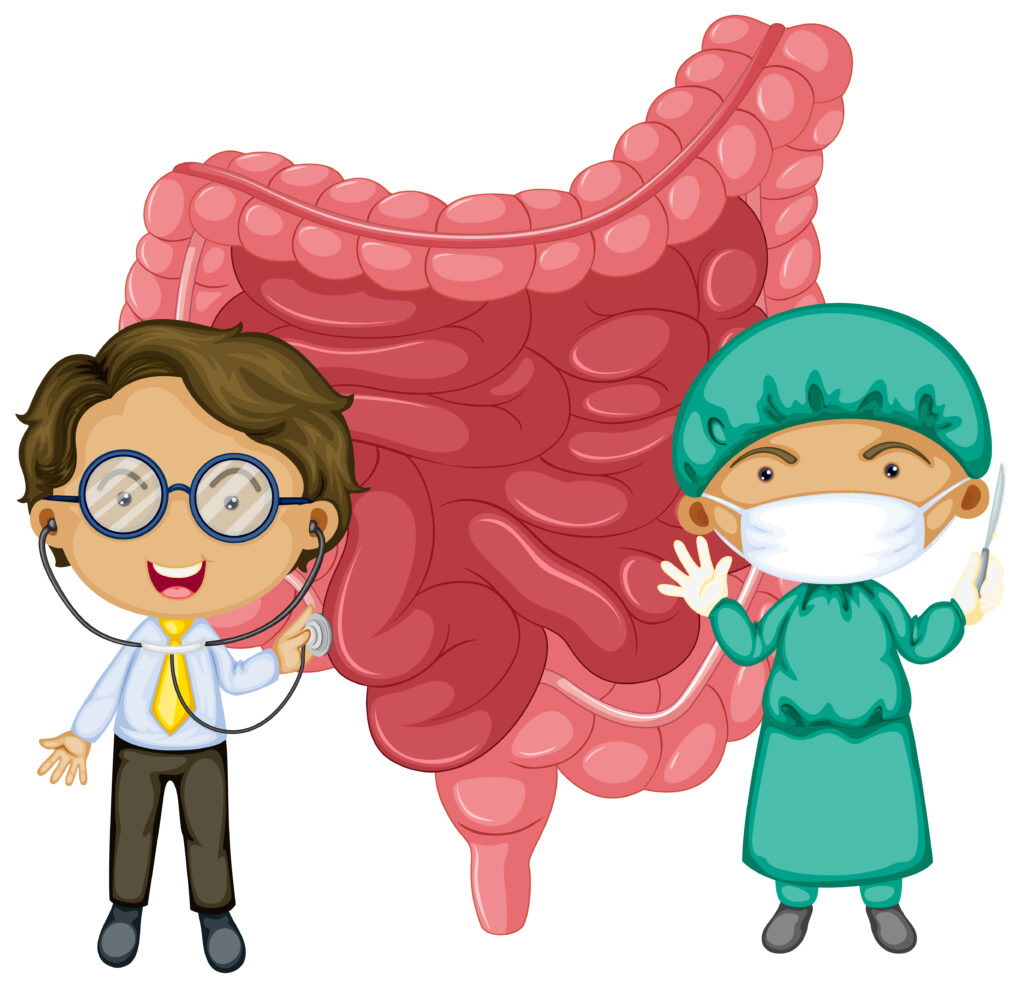Ulcerative colitis is a chronic inflammatory bowel disease (IBD) that affects the large intestine, particularly the colon and rectum. This condition is characterized by recurring inflammation, ulcers, and sores in the lining of the colon, leading to various symptoms such as abdominal pain, diarrhea, and blood in the stool. As one of the two primary types of IBD, along with Crohn’s disease, ulcerative colitis is a condition that significantly impacts the quality of life. This comprehensive guide will explore the causes, symptoms, and management strategies to help those affected by ulcerative colitis lead healthier lives.
Table of Contents
While there is no cure for ulcerative colitis, early diagnosis and the right treatment plan can help manage the condition effectively, enabling people to achieve long-term remission. This post delves deep into the science of ulcerative colitis, symptoms, potential complications, and various methods for managing the disease.
1. Understanding Ulcerative Colitis
Ulcerative colitis is a chronic autoimmune disease where the immune system mistakenly attacks the lining of the colon, causing inflammation and the formation of ulcers. This persistent inflammation disrupts the normal functioning of the digestive system, leading to uncomfortable and sometimes debilitating symptoms.
Unlike Crohn’s disease, which can affect any part of the digestive tract, ulcerative colitis is confined to the colon. The disease typically begins in the rectum and lower colon but can spread to the entire large intestine. The extent of inflammation plays a significant role in the severity of symptoms and the treatment approach.
In the United States alone, around 600,000 people live with ulcerative colitis, and the condition is often diagnosed in young adults between the ages of 15 and 30. It can, however, develop at any age.
2. What Causes Ulcerative Colitis?
Despite decades of research, the exact cause of ulcerative colitis remains unclear. However, experts believe that the disease results from a combination of genetic, environmental, and immune system factors.


Genetic Factors
People with a family history of inflammatory bowel disease are more likely to develop ulcerative colitis. Researchers have identified several genes associated with the condition, although having these genes does not guarantee that someone will develop ulcerative colitis. It simply increases the risk.
Immune System Response
Ulcerative colitis is considered an autoimmune disorder, meaning the body’s immune system mistakenly attacks healthy tissue. In this case, the immune system targets the cells of the colon lining, causing chronic inflammation. Some researchers believe that a bacterial or viral infection might trigger this inappropriate immune response, although no specific pathogen has been conclusively linked to ulcerative colitis.
Environmental Triggers
Certain environmental factors may also play a role in the development or exacerbation of ulcerative colitis symptoms. These include:
- Diet: A high-fat, low-fiber diet can contribute to inflammation in the colon, though no specific foods are known to cause ulcerative colitis directly.
- Stress: While stress does not cause ulcerative colitis, it can trigger flare-ups and worsen symptoms.
- Antibiotics: Long-term use of antibiotics may disrupt gut bacteria and increase the risk of developing inflammatory bowel disease.
3. Symptoms and Types of Ulcerative Colitis
Ulcerative colitis presents with a wide range of symptoms, which can vary depending on the severity of inflammation and the area of the colon affected. Common symptoms include:


- Abdominal pain and cramping: This pain is typically located in the lower abdomen and is often accompanied by bloating and discomfort.
- Diarrhea with blood or mucus: Frequent bowel movements are a hallmark of ulcerative colitis. Many people experience bloody stools or notice mucus in their stool during flare-ups.
- Urgency to defecate: The inflammation in the colon can lead to an urgent need to use the bathroom, even when the bowel is empty.
- Fatigue: Chronic inflammation can lead to anemia, causing tiredness and general malaise.
- Weight loss: Severe cases of ulcerative colitis can result in malnutrition and unintended weight loss.
- Rectal pain or bleeding: Inflammation that starts in the rectum can cause discomfort and rectal bleeding.
Ulcerative colitis is classified into several types based on the location of inflammation in the colon:
- Ulcerative proctitis: Inflammation is limited to the rectum. This is typically the mildest form of ulcerative colitis.
- Proctosigmoiditis: Irritation influences the rectum and the lower end of the colon (the sigmoid colon).
- Left-sided colitis: Inflammation extends from the rectum up the left side of the colon.
- Pancolitis: This more severe form of ulcerative colitis affects the entire colon, often causing significant symptoms.
- Fulminant colitis: A rare but life-threatening form, fulminant colitis affects the entire colon and causes severe pain, diarrhea, and fever.
4. Diagnosing Ulcerative Colitis
Accurate diagnosis is crucial for determining the best treatment approach for ulcerative colitis. Diagnosing the condition involves several tests and procedures:
Medical History and Physical Examination
A doctor will first assess a patient’s medical history, focusing on family history, symptoms, and any other health issues. A physical examination, particularly of the abdomen, helps identify signs of tenderness, bloating, or swelling.
Blood Tests
Blood tests help identify markers of inflammation in the body, such as elevated levels of C-reactive protein (CRP). A complete blood count (CBC) may reveal anemia, which is common in people with ulcerative colitis due to chronic blood loss.
Stool Sample
A stool sample can help rule out infections that may cause similar symptoms to ulcerative colitis, such as bacterial, viral, or parasitic infections.
Endoscopy and Colonoscopy
The most definitive way to diagnose ulcerative colitis is through a colonoscopy or sigmoidoscopy. During these procedures, a flexible tube with a camera is inserted into the rectum to visualize the lining of the colon. This allows doctors to assess the severity of inflammation and take tissue samples (biopsies) for further analysis.
Imaging Tests
In some cases, doctors may recommend imaging tests such as a CT scan or MRI to assess the extent of inflammation and rule out other potential complications like abscesses or blockages.
5. Treatment Options for Ulcerative Colitis
Although ulcerative colitis is a chronic condition, several treatment options can help manage symptoms, reduce inflammation, and promote long-term remission. The decision of treatment relies upon the seriousness of the infection and the patient’s reaction to past medicines.


Medications
- Aminosalicylates (5-ASAs): These anti-inflammatory drugs are often the first line of treatment for mild to moderate ulcerative colitis. They help reduce inflammation in the colon and can be taken orally or administered rectally.
- Corticosteroids: For more severe flare-ups, corticosteroids such as prednisone may be prescribed to quickly reduce inflammation. However, long-term use of corticosteroids is not recommended due to side effects like weight gain, high blood pressure, and increased risk of infections.
- Immunomodulators: These drugs work by suppressing the immune system to prevent it from attacking the colon lining. Examples include azathioprine and methotrexate. These medications may take several months to become effective.
- Biologics: Biologics are a newer class of medications that target specific proteins involved in the immune response. Drugs like infliximab and adalimumab are often used in people who do not respond to other treatments. These are administered through injections or infusions.
- Antibiotics: In some cases, antibiotics are prescribed to treat infections or complications related to ulcerative colitis, such as abscesses or pouchitis (inflammation of the pouch created during surgery).
Surgery
Medical procedure might be vital for individuals with extreme ulcerative colitis who don’t answer drug. The most common procedure is a proctocolectomy, in which the colon and rectum are removed. After the surgery, an ileal pouch-anal anastomosis (IPAA) may be performed to create a new way for waste to leave the body without the need for an external stoma.
6. Managing Ulcerative Colitis Symptoms: Lifestyle and Dietary Changes
While medications are crucial for managing ulcerative colitis, lifestyle and dietary changes can play an equally important role in controlling symptoms and preventing flare-ups.
Dietary Tips
- Follow a low-residue diet during flare-ups: This diet limits high-fiber foods, which can irritate the colon. Low-residue foods like white rice, bananas, and cooked vegetables are easier to digest.
- Stay hydrated: Diarrhea can cause dehydration, so it’s important to drink plenty of water, herbal teas, and electrolyte-rich beverages.
- Avoid trigger foods: Spicy foods, caffeine, alcohol, and high-fat foods may trigger symptoms or worsen flare-ups. Keeping a food journal can assist with distinguishing which food sources trigger your side effects.
- Dairy products: Lactose intolerance is common among people with ulcerative colitis.
- High-fiber foods: Raw fruits, vegetables, seeds, and nuts can be harder to digest and may exacerbate symptoms during flare-ups.
- Carbonated drinks: These can cause gas and bloating, which may increase discomfort.
Probiotics and Prebiotics
Probiotics are advantageous microorganisms that can assist with adjusting the stomach microbiome. Some studies suggest that incorporating probiotics into your diet may reduce inflammation and improve gut health for people with ulcerative colitis. Foods rich in probiotics include yogurt, kefir, sauerkraut, and fermented vegetables. Prebiotics, found in foods like bananas, garlic, and onions, feed the good bacteria in your gut and may also support overall digestive health.
Regular Physical Activity
Exercise may not directly affect ulcerative colitis, but it can improve overall health and well-being. Regular physical activity can help reduce stress, boost mood, and improve gut motility, all of which are beneficial for managing symptoms. Low-impact exercises like walking, swimming, and yoga are particularly suitable for people with ulcerative colitis.
Stress Management
Stress is a common trigger for ulcerative colitis flare-ups, so incorporating stress-reduction techniques into your daily routine can significantly improve your condition. Techniques such as mindfulness, meditation, deep breathing, and progressive muscle relaxation can help alleviate stress. Setting aside time for hobbies, socializing with friends and family, and practicing self-care can also help manage stress levels.
Adequate Rest
Ulcerative colitis can be exhausting, especially during flare-ups. Guaranteeing you get sufficient rest is vital for recuperation. Aim for 7-9 hours of sleep per night and establish a regular sleep schedule to improve your energy levels and reduce fatigue.
7. Potential Complications of Ulcerative Colitis
Without proper management, ulcerative colitis can lead to several complications, some of which may be life-threatening. It’s important to monitor your symptoms and work closely with a healthcare professional to minimize the risk of complications.

Toxic Megacolon
Toxic megacolon is a rare but serious complication where the colon becomes severely inflamed and dilated. This condition can cause the colon to stop working, leading to severe pain, fever, and even life-threatening infection. If toxic megacolon occurs, emergency medical treatment is required, often involving surgery.
Colon Cancer
People with long-term ulcerative colitis, especially those with pancolitis, have an increased risk of developing colon cancer. The risk is higher for those who have had the condition for over 8-10 years. Regular colonoscopies and screenings are essential for early detection and prevention.
Severe Bleeding
Chronic inflammation in the colon can cause ulcers to bleed, leading to significant blood loss. In severe cases, this may require hospitalization and, in rare cases, a blood transfusion.
Osteoporosis
Long-term use of corticosteroids, often prescribed for managing ulcerative colitis flare-ups, can weaken bones and increase the risk of osteoporosis. Regular weight-bearing exercises, adequate calcium and vitamin D intake, and limiting corticosteroid use when possible can help protect bone health.
Primary Sclerosing Cholangitis (PSC)
PSC is a condition that causes inflammation and scarring in the bile ducts of the liver, leading to liver damage over time. While PSC is rare, it is more common in people with ulcerative colitis, and regular liver function tests are important for early detection.
Blood Clots
People with inflammatory bowel diseases, including ulcerative colitis, have an increased risk of developing blood clots. These clots can form in the legs (deep vein thrombosis) or travel to the lungs (pulmonary embolism), which can be life-threatening. Staying active and hydrated can help reduce this risk.
8. Emotional and Mental Health Challenges
Living with a chronic illness like ulcerative colitis can take a toll on your mental health. Many people with the condition experience anxiety, depression, and feelings of isolation due to the unpredictability of symptoms and the impact on daily life. Recognizing these challenges is an important step toward addressing them.
Coping with Anxiety and Depression
If you’re struggling with anxiety or depression, it’s important to reach out for support. Cognitive-behavioral therapy (CBT), mindfulness techniques, and relaxation exercises can be effective in managing mental health symptoms. In some cases, antidepressants or anti-anxiety medications may be prescribed to help alleviate emotional stress.
Building Resilience
Resilience is the ability to bounce back from adversity. Developing a positive mindset, staying informed about your condition, and setting realistic goals can help build emotional resilience. Joining a support group or connecting with others who have ulcerative colitis can provide a sense of community and reduce feelings of isolation.
9. The Role of Support Systems in Managing Ulcerative Colitis
A strong support system is essential when managing a chronic condition like ulcerative colitis. Having the right people by your side can help you navigate the physical, emotional, and mental challenges that arise.


Family and Friends
Your close friends and family can provide emotional support, help with daily tasks during flare-ups, and accompany you to medical appointments. Open communication with your loved ones about your condition and needs can enhance their ability to support you effectively.
Healthcare Team
Your healthcare team, which may include a gastroenterologist, nutritionist, and mental health professional, plays a central role in managing your ulcerative colitis. Regular check-ups and open communication with your doctor ensure that your treatment plan is optimized and any potential complications are addressed early.
Support Groups
Joining an ulcerative colitis support group—whether in person or online—allows you to connect with others who understand what you’re going through. These groups provide a safe space to share experiences, exchange tips for symptom management, and offer mutual encouragement.
10. Conclusion
Ulcerative colitis is a lifelong condition that requires proactive management and a multidisciplinary approach to care. While the disease can present significant challenges, many people with ulcerative colitis are able to live fulfilling lives through the combination of medical treatments, lifestyle changes, and emotional support. By working closely with healthcare professionals and making informed choices, you can successfully manage symptoms, reduce flare-ups, and achieve long-term remission.
Living with ulcerative colitis can be difficult, but understanding the condition, recognizing triggers, and adopting healthy habits can make a world of difference. Remember that each individual’s experience with ulcerative colitis is unique, so it’s essential to find the treatment plan and lifestyle modifications that work best for you.
FAQs
What triggers ulcerative colitis flare-ups?
Flare-ups can be triggered by a variety of factors, including stress, certain foods (such as high-fat or spicy foods), infections, or changes in medication. Every person’s triggers can vary, so keeping a food and symptom diary may help identify specific causes of flare-ups.
Is ulcerative colitis curable?
No, ulcerative colitis is a chronic condition that currently has no cure. However, with proper treatment and lifestyle changes, many people can manage their symptoms, reduce the frequency of flare-ups, and achieve long-term remission.
Can ulcerative colitis increase the risk of colon cancer?
Yes, individuals with long-term ulcerative colitis, especially those who have had the disease for over 8-10 years, have an increased risk of developing colon cancer. Regular screenings and colonoscopies are recommended to monitor for early signs of cancer.
What is the difference between ulcerative colitis and Crohn’s disease?
Both are types of inflammatory bowel disease (IBD), but ulcerative colitis only affects the colon and rectum, while Crohn’s disease can affect any part of the gastrointestinal tract. Ulcerative colitis also causes continuous inflammation, while Crohn’s disease often occurs in patches.
Can diet help manage ulcerative colitis?
While diet alone cannot cure ulcerative colitis, certain dietary changes can help manage symptoms. A low-residue or low-fiber diet is often recommended during flare-ups to reduce irritation, and avoiding trigger foods (such as dairy, caffeine, or spicy foods) can prevent worsening symptoms.



1 comment
[…] place with a gathering of conditions known as provocative inside sicknesses (IBD). Not at all like ulcerative colitis, which influences just the colon, Crohn’s infection can influence any piece of the GI lot, […]